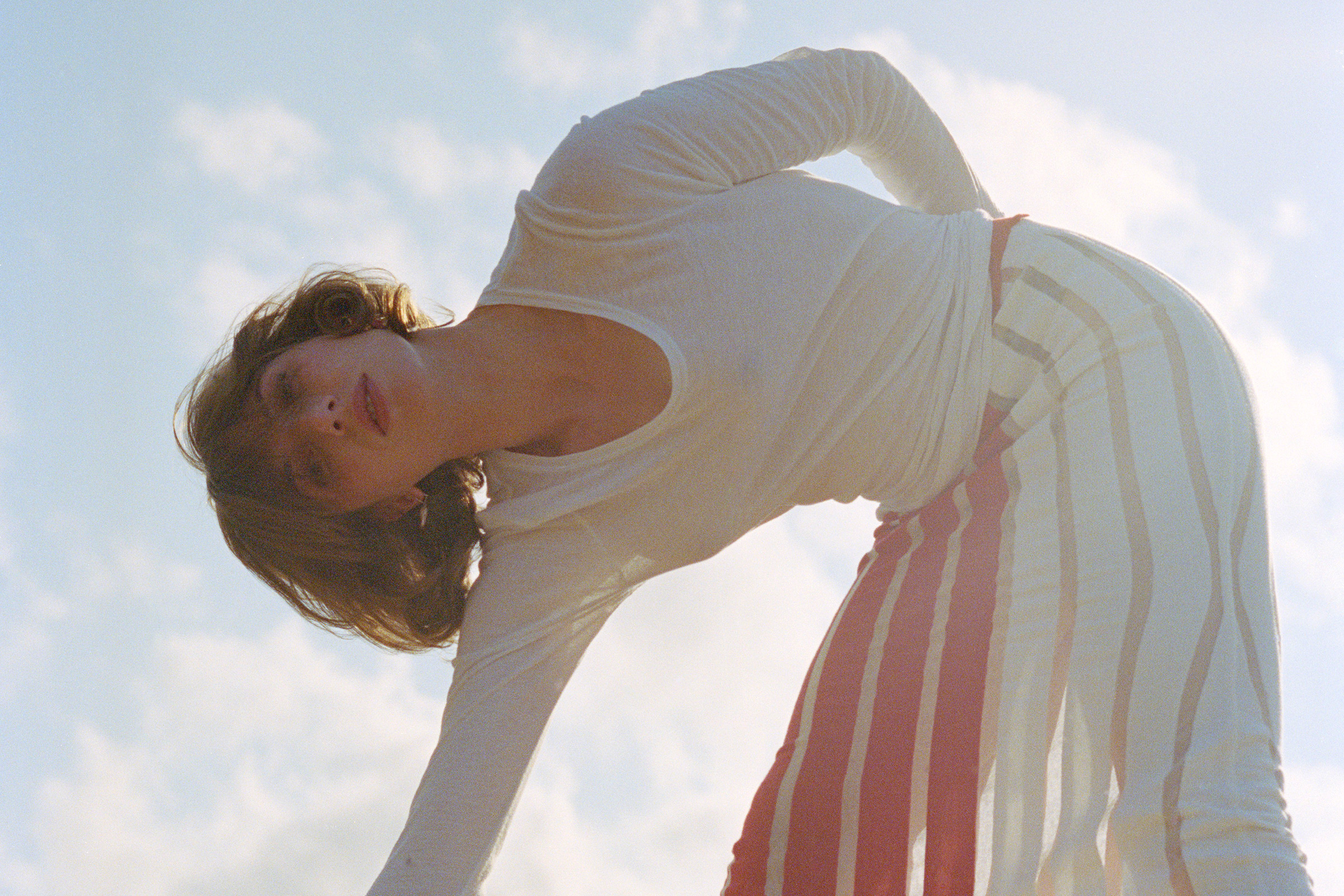Aldous Harding keeps her focus so you can let go.
Have you ever seen the New Zealand singer-songwriter Aldous Harding perform? There’s something about her stage (and desk!) presence that’s just as commanding and poignant as her compositions. She sings with total concentration, gazing into the distance with a steely facial expression that almost obscures the vulnerability of her music.
Harding’s new record, Designer, is quietly forceful and enigmatic, showcasing Harding’s velvety vocals and mysterious lyrics on top of deceptively simple instrumental arrangements. Highlights include the sprawling, confident lead single, “The Barrel,” the spare, sorrowful “Heaven Is Empty,” and the playful title track, which contains one of the most striking verses of 2019 so far: “Tears water the flowers of need / And you bend my day at the knee / Sit down, we’ll frame the far side / Shapes live forever, designer.”
We recently spoke to Harding about her new record, her love of dance, and an unforgettable Joan As Police Woman performance. Read the interview below.
Designer is out now on 4AD.
AdHoc: Where’s home right now?
Aldous Harding: It’s New Zealand, and sometimes Cardiff, in Wales.
I know you took a break from performing following your last tour. What was it like to have some quiet time?
It was like the day after a big festival, when you’re a kid. Everyone was gone. It’s all I’d been wishing for, so it was odd to get my wish and be unprepared for myself. And how it had left me, I suppose.
The touring?
Yeah.
Did you take some time to rest after that?
[First] I made the album, in April [2018], and then I said, “Okay, now I’m going to stop.”
When were you writing this album?
I wrote four [songs] on the road, then three at home in New Zealand, then two whilst recording.
Do you feel like it’s a continuation of your earlier work?
I suppose anything, unless it’s identical, is a new direction, but I don’t think it’s too far or too close for us not to be having this conversation. I think it’s [a] pretty natural evolution, though. I wanted my voice to sit back; I wanted to show that I didn’t have to be serious to be serious. [The sessions were on] a much bigger scale than I was used to. I was intimidated until it started. I was going, “How is this going to [come together]?” But then we got in there and I knew exactly what to do. I had a feeling that it was going to work. I’d thought that I had enough ideas—and I knew John [Parish—who produced Harding’s last record, Party] would have enough ideas—that it would be at least something that we liked.
Where did the album title, Designer, come from?
Well, the name is just the word. I’m not trying to be cryptic. It is exactly all the ways you can use that word.
What are some of the ways that come to mind for you?
I’m the designer; you’re the designer. Like, is the album about me? [Is] someone endowing you as the designer? I sound way more affected by my own music and ideas than I am, but I’m just trying to put this into view.
I wanted it to be loose. But also it’s classy. It’s not intimidating, but there’s a lot of honor associated with that word, and I wanted everyone to feel that.
Were you listening to any music while working on the record that was influential?
Yeah, I had a couple of songs and treatments on records that were in my mind. But I don’t want to reveal those, because I think that puts us at risk of lazy comparisons or planting seeds that might be detrimental to an untethered experienced. It’s like you sing one high note and do one Kate Bush cover and suddenly you sound like Kate Bush. Or you work with PJ Harvey’s producer and you sound like PJ Harvey.
Has performing always been a big part of your relationship to music?
I’ve always been a performer. I was always putting on my mum’s shoes doing that kind of thing, like, “Mum, watch this!” And when the early teens hit you become insecure; you lose all of that and you try to be normal, or you try to protect yourself in a really sad way. Now I’m over that as much as I can be.
What are some performances you’ve witnessed that have really affected you?
Joan As Police Woman. She was great.
What about that performance do you remember?
She was strong. She was sexy. She was vulnerable. And I felt like she needed me as much as I needed her. That combination made me realize what it looked like to watch somebody who uses [music] as medicine. If you’re using [music] to heal something, assumedly you care about that thing needing to be healed so much you wouldn’t let anything get in the way of its healing. I just think that’s the sexiest shit I’ve ever seen.
You said in a recent interview that “Music is the language.” Has there ever been another language for you?
Dance—I love to dance.
How does that interact with your music practice?
I love to dance, but I don’t necessarily want to incorporate it into the live show. That’s too much self-expression. If I started to dance I’d lose focus—that’s why I dance—but [onstage] I need to be focused, because the songs are complex in their simplicity.
This quality of focus seems really important to you.
Yes. Isn’t that what you hear people say in the movies when they’re encouraging somebody about to attempt something great?

